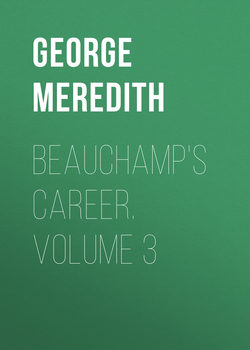Читать книгу Beauchamp's Career. Volume 3 - George Meredith - Страница 2
CHAPTER XX
A DAY AT ITCHINCOPE
ОглавлениеAn election in Bevisham was always an exciting period at Itchincope, the large and influential old estate of the Lespels, which at one time, with but a ceremonious drive through the town, sent you two good Whig men to Parliament to sit at Reform banquets; two unswerving party men, blest subscribers to the right Review, and personally proud of its trenchancy. Mr. Grancey Lespel was the survivor of them, and well could he remember the happier day of his grandfather, his father, and his own hot youth. He could be carried so far by affectionate regrets as to think of the Tories of that day benignly:—when his champion Review of the orange and blue livery waved a wondrous sharp knife, and stuck and bled them, proving to his party, by trenchancy alone, that the Whig was the cause of Providence. Then politics presented you a table whereat two parties feasted, with no fear of the intrusion of a third, and your backs were turned on the noisy lower world, your ears were deaf to it.
Apply we now the knocker to the door of venerable Quotation, and call the aged creature forth, that he, half choked by his eheu!—
'A sound between a sigh and bray,'
may pronounce the familiar but respectable words, the burial-service of a time so happy!
Mr. Grancey Lespel would still have been sitting for Bevisham (or politely at this elective moment bowing to resume the seat) had not those Manchester jugglers caught up his cry, appropriated his colours, displaced and impersonated him, acting beneficent Whig on a scale approaching treason to the Constitution; leaning on the people in earnest, instead of taking the popular shoulder for a temporary lift, all in high party policy, for the clever manoeuvre, to oust the Tory and sway the realm. See the consequences. For power, for no other consideration, those manufacturing rascals have raised Radicalism from its primaeval mire—from its petty backslum bookseller's shop and public-house back- parlour effluvia of oratory—to issue dictates in England, and we, England, formerly the oak, are topsy-turvy, like onions, our heels in the air!
The language of party is eloquent, and famous for being grand at illustration; but it is equally well known that much of it gives us humble ideas of the speaker, probably because of the naughty temper party is prone to; which, while endowing it with vehemence, lessens the stout circumferential view that should be taken, at least historically. Indeed, though we admit party to be the soundest method for conducting us, party talk soon expends its attractiveness, as would a summer's afternoon given up to the contemplation of an encounter of rams' heads. Let us be quit of Mr. Grancey Lespel's lamentations. The Whig gentleman had some reason to complain. He had been trained to expect no other attack than that of his hereditary adversary-ram in front, and a sham ram—no honest animal, but a ramming engine rather—had attacked him in the rear. Like Mr. Everard Romfrey and other Whigs, he was profoundly chagrined by popular ingratitude: 'not the same man,' his wife said of him. It nipped him early. He took to proverbs; sure sign of the sere leaf in a man's mind.
His wife reproached the people for their behaviour to him bitterly. The lady regarded politics as a business that helped hunting-men a stage above sportsmen, for numbers of the politicians she was acquainted with were hunting-men, yet something more by virtue of the variety they could introduce into a conversation ordinarily treating of sport and the qualities of wines. Her husband seemed to have lost in that Parliamentary seat the talisman which gave him notions distinguishing him from country squires; he had sunk, and he no longer cared for the months in London, nor for the speeches she read to him to re-awaken his mind and make him look out of himself, as he had done when he was a younger man and not a suspended Whig. Her own favourite reading was of love- adventures written in the French tongue. She had once been in love, and could be so sympathetic with that passion as to avow to Cecilia Halkett a tenderness for Nevil Beauchamp, on account of his relations with the Marquise de Rouaillout, and notwithstanding the demoniacal flame-halo of the Radical encircling him.
The allusion to Beauchamp occurred a few hours after Cecilia's arrival at Itchincope.
Cecilia begged for the French lady's name to be repeated; she had not heard it before, and she tasted the strange bitter relish of realization when it struck her ear to confirm a story that she believed indeed, but had not quite sensibly felt.
'And it is not over yet, they say,' Mrs. Grancey Lespel added, while softly flipping some spots of the colour proper to radicals in morals on the fame of the French lady. She possessed fully the grave judicial spirit of her countrywomen, and could sit in judgement on the personages of tales which had entranced her, to condemn the heroines: it was impolitic in her sex to pity females. As for the men—poor weak things! As for Nevil Beauchamp, in particular, his case, this penetrating lady said, was clear: he ought to be married. 'Could you make a sacrifice?' she asked Cecilia playfully.
